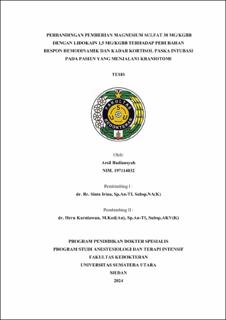| dc.contributor.advisor | Irina, Rr Sinta | |
| dc.contributor.advisor | Kurniawan, Heru | |
| dc.contributor.author | Radiansyah, Arsil | |
| dc.date.accessioned | 2024-08-21T06:53:03Z | |
| dc.date.available | 2024-08-21T06:53:03Z | |
| dc.date.issued | 2024 | |
| dc.identifier.uri | https://repositori.usu.ac.id/handle/123456789/95848 | |
| dc.description.abstract | Introduction In craniotomy, stress responses can occur from increased
hemodynamics to hormonal stress responses such as increased cortisol levels.
Intubation is a major factor that must be considered during the induction of
neuroanesthesia. Endotracheal intubation is an important component of general
anesthesia in craniotomy surgery. Magnesium sulfate has advantages in terms of
maintaining the stability of brain autoregulation and is neuroprotective.
Method Magnesium sulfate has advantages in terms of maintaining the stability of
brain autoregulation and is neuroprotective. With a minimum total sample for the
entire group of 30 samples which were divided into 3 groups of patients who
received lidocaine, MgSO4 and a control group who received NaCl 0,9%
Results There were significant differences between the three groups with
hemodynamic and serume cortisol values found to be lower in the lidocaine group
Conclusion Intravenous administration of Lidocaine 1.5 mg/kgbb is most effective
in attenuating the stress response in the form of increased blood pressure, HR and
serum cortisol levels due to laryngoscopy and intubation in patients undergoing
craniotomy compared to intravenous administration of MgSO4 30 mg/kgbb | en_US |
| dc.language.iso | id | en_US |
| dc.publisher | Universitas Sumatera Utara | en_US |
| dc.subject | Craniotomy | en_US |
| dc.subject | Intubation | en_US |
| dc.subject | Lidocaine | en_US |
| dc.subject | MgSO4 | en_US |
| dc.subject | SDGs | en_US |
| dc.title | Perbandingan Pemberian Magnesium Sulfat 30 Mg/KgBB dengan Lidokain 1,5 Mg/KgBB terhadap Perubahan Respon Hemodinamik dan Kadar Kortisol Paska Intubasi pada Pasien yang Menjalani Kraniotomi | en_US |
| dc.title.alternative | Comparison of Magnesium Sulphate 30 mg/KgBW with Lidocaine 1,5 mg/KgBW in Hemodynamic Changes and Cortisol Level Post Intubation in Patient Undergoing Craniotomy | en_US |
| dc.type | Thesis | en_US |
| dc.identifier.nim | NIM197114032 | |
| dc.identifier.nidn | NIDN0027097603 | |
| dc.identifier.kodeprodi | KODEPRODI11751#Anestesiologi dan Terapi Insentif | |
| dc.description.pages | 139 Pages | en_US |
| dc.description.type | Tesis Magister | en_US |


